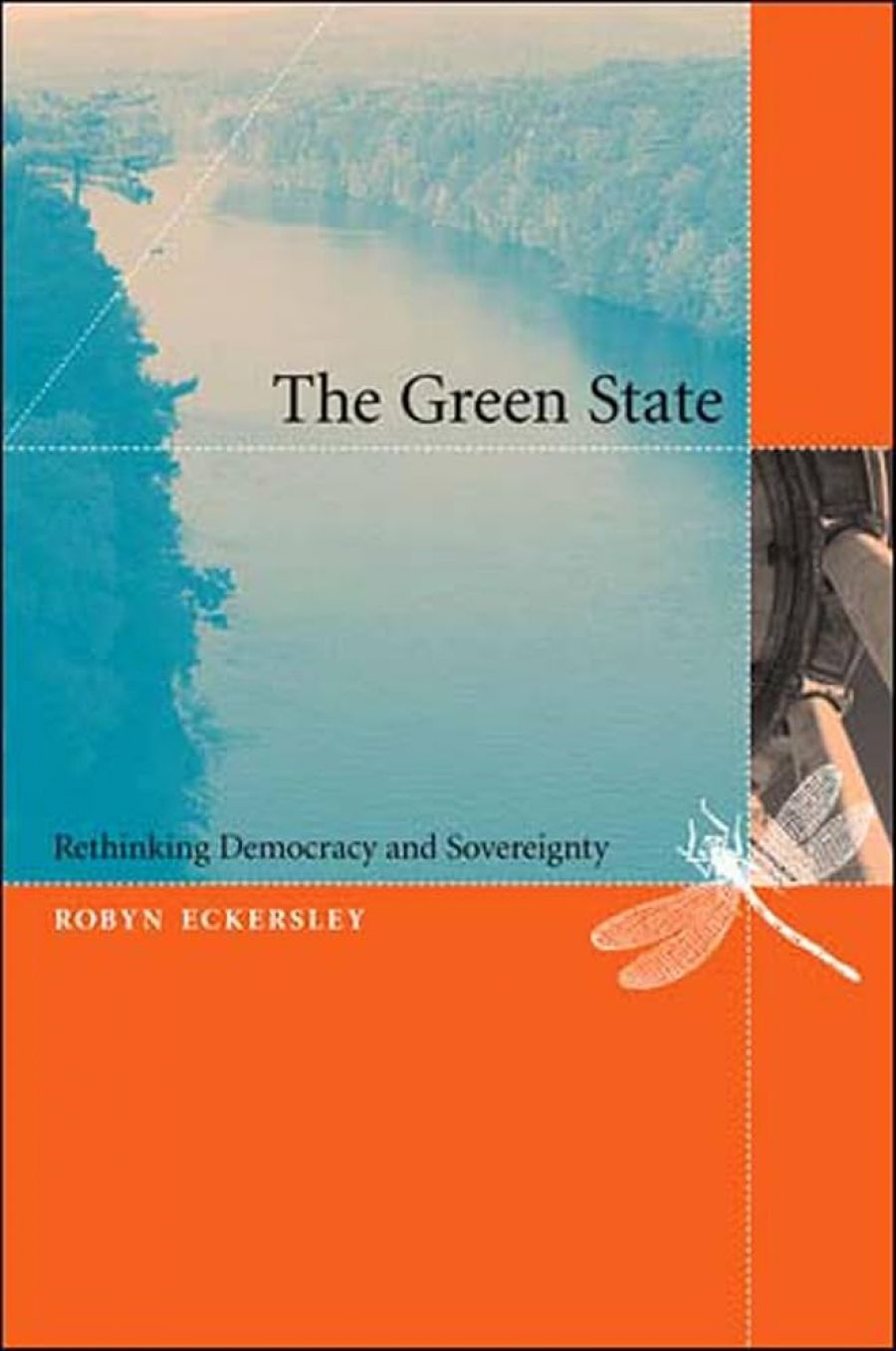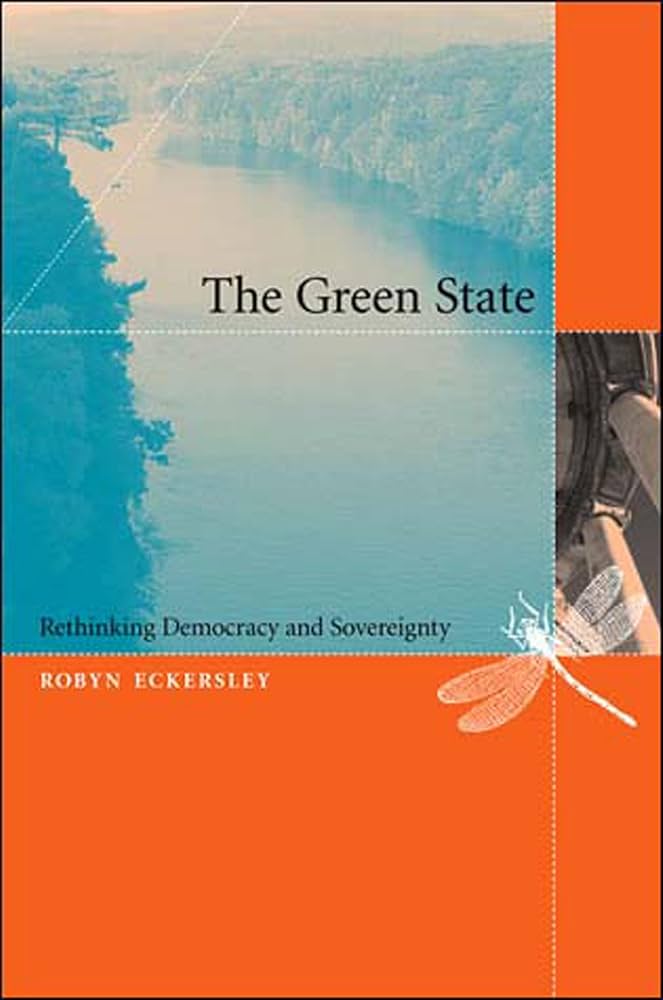
- Free Article: No
- Contents Category: Politics
- Review Article: Yes
- Article Title: The Shape of Democracy
- Online Only: No
- Custom Highlight Text:
Robyn Eckersley’s provocative new study of environmental governance reinvests belief in the democratic state as a site of ethical action and ecological responsibility. She counters a trend in recent Green thinking to see the state, in particular the liberal democratic state, as the enemy of current and future environmental well-being. Eckersley’s own background is in political science, and she largely engages with other political theorists. However, the anti-statist perspective that she questions is common across a range of environmental disciplines, and it is refreshing to see a re-visioning of the political structures we already have rather than an imagined future ‘ecotopia’ as an answer to environmental ills.
- Book 1 Title: The Green State
- Book 1 Subtitle: Rethinking Democracy and Sovereignty
- Book 1 Biblio: MIT Press, $42.95 pb, 344 pp
- Book 1 Cover Small (400 x 600):

- Book 1 Cover (800 x 1200):

Eckersley does not defend liberal ideology from charges of environmental unsustainability. Liberal democracy has a history of subordinating the environment to more profitable concerns, and Margaret Thatcher’s reaction to the Falklands War, Eckersley reports, is telling in this regard: ‘It is exciting to have a real crisis on your hands when you have spent half your political life dealing with humdrum issues like the environment.’ The state, in a broader sense, has proved largely prohibitive to the cause of global environmentalism, with most nations protecting their own interests and boundaries rather than thinking ecologically, in terms of interconnection with other states. Yet Eckersley contends: ‘Given that the green political project is one that demands far-reaching changes to both economies and societies, it is difficult to imagine how such changes might occur on the kind of scale that is needed without the active support of states.’
Her focus is therefore a ‘postliberal’ state that harnesses the principles of the liberal democratic ideal – its concern with justice and freedom, for example – while overcoming its deficiencies in regards to the non-human world and ‘transboundary’ relations. The book proposes a model of ecological democracy that supplants a focus on the atomised individual with one that attends to the individual-in-the-world. Eckersley’s interest is in mapping the shape of this democracy. If a ‘good state’ is one that upholds civil and political rights, the rule of law, and the separation of powers, then a ‘green state’ must be all this and more.
Eckersley usefully draws upon environmental philosophy, eco-critical theory and Green political thought to construct a language of ‘critical political ecology’. With this she articulates a distinction between a Hobbesian view of the state as an asocial and competing entity amongst other nations and its understanding within ecological democracy as globally connected. This external connectivity of the Green state is mirrored by its internal community, too, enabling an inclusivity and a sense of responsibility to others that a democracy ideally provides. All individuals potentially affected by environmental change and ecological risks must be taken into account in the Green state Eckersley envisages, inclusive of the born as well as the unborn (both human and non-human), who are then incorporated into environmental decision-making as if they were present. The Green state takes on the role of ‘ecological trustee’, acting in both local and global interests.
Though sometimes unclear about the specific meaning of such terms as ‘ecological freedom’ and ‘environmental justice’ – perhaps reflective of an assumed audience of political scientists – this book’s placement of rights and responsibilities at the heart of political and ethical communities makes a substantial contribution to the cause of environmental human rights, which are currently absent from the United Nations Declaration. Productively, and a point of difference between this book and other accounts of the role of the state in environmental protection, Eckersley does not wholly look to the rule of law and constitutional change for the success of ecological democracy. Her recognition of the state’s capacity to foster care and ethical action among its members via a reimagining of human and non-human relations in a ‘green public sphere’ is one of the significant contributions this book makes to a renovated green politics. ‘Ecological citizenship’ becomes a matter of self-practice as well as regulated behaviour, and here Eckersley appears informed by post-structural thinking in which the self is always in the process of forming.
Similarly, the Green state she describes ‘can never be finalised’ and responds to its community reflexively, engaged in an ongoing process of defining the rights of its citizens. There is thus an implicitly ecological quality to the state–public relation that Eckersley describes. It is in this that her more general readers might find the most generative ideas. While Eckersley refers to our current situation as an ‘ecological crisis’, this is not an apocalyptic account of the state of the world. Nor is it a far-off future that the book describes. One of the engaging qualities of Eckersley’s thesis is its grounding in contemporary examples of the political, economic and cultural forces, such as environmental multilateralism and ‘ecological modernisation’, that have already begun to transform liberal democracies from isolationist ecological exploiters. From these examples, there is no leap of the imagination required by the reader to understand how a Green state might work.
Eckersley’s experience as a thinker and writer is evident in The Green State. She offers a conceptual map for political change and environmental hope that is modest in scale yet large in its consequences. While some of the book seems overly concerned with pre-empting attacks on its argument (presumably reflecting the unpopularity of the state among environmental thinkers), this is a confident and extremely articulate contribution to ecological discourse and, moreover, a timely intervention into the necessary ‘greening’ of the state in the twenty-first century.


Comments powered by CComment